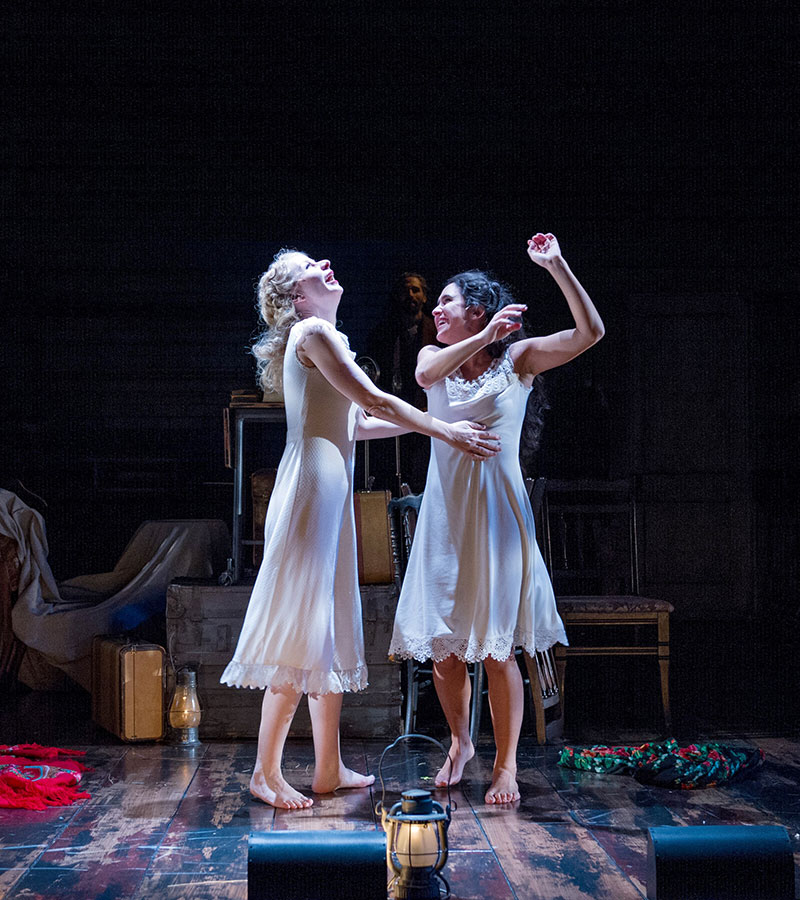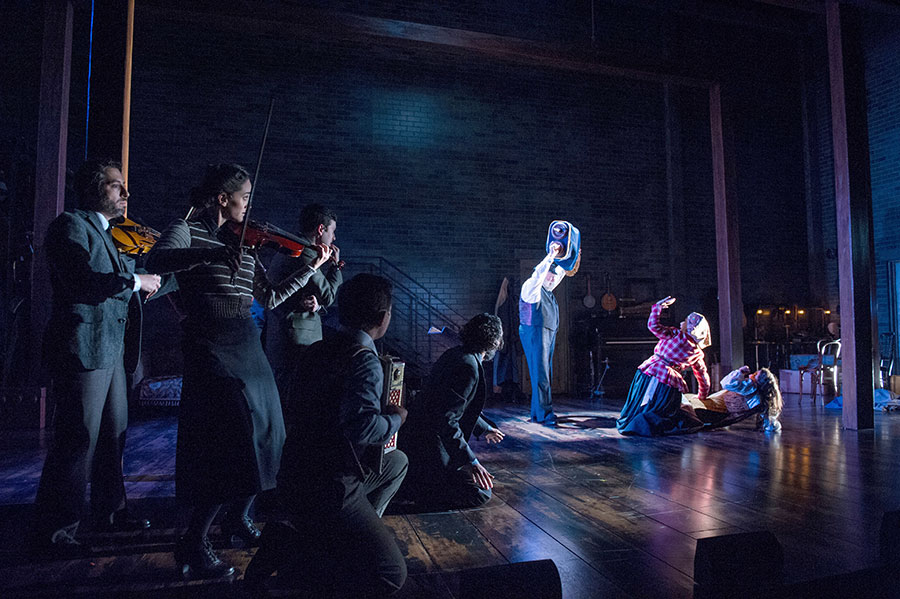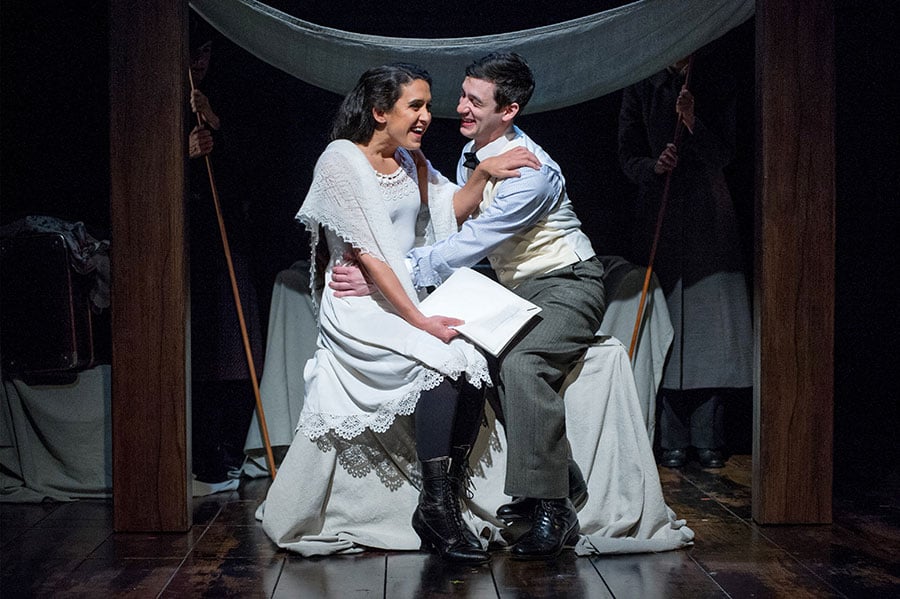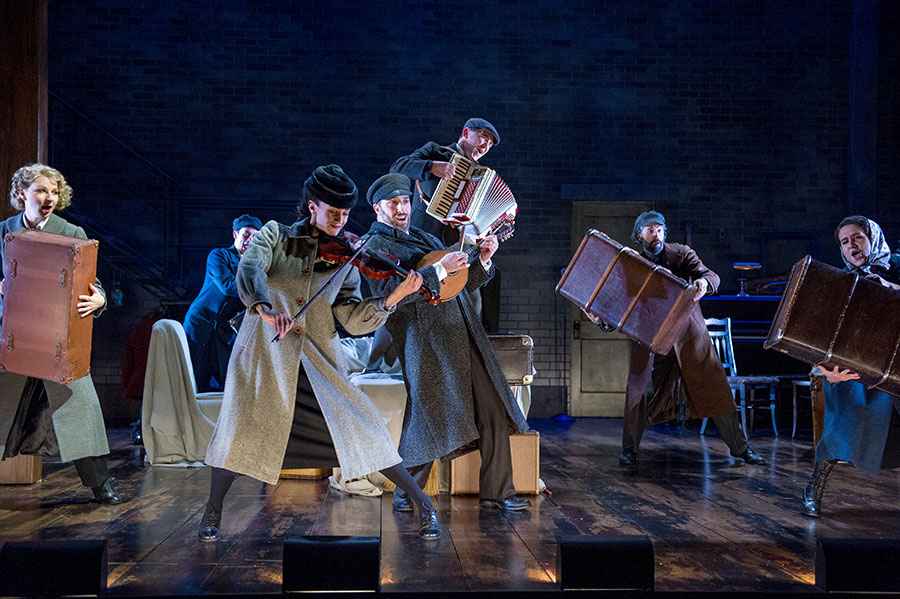The controversial scene that ends this “true story of a little Jewish play” has been foretold at length throughout the show and mentioned in much publicity, so it’s no spoiler to report that we all pretty much know it’s coming. The scene when staged in 1923 on Broadway was deemed indecent and the production banned because it showed two young women passionately embracing and dancing in the rain. Today the scene, as beautifully performed by Susan Lynskey and Emily Shackelford in a brief downpour on the Kreeger stage at Arena, is seen as simply lovely—and so unobjectionable one might wonder what all the fuss was about.

The fuss in its time was about a lot, as we learn from Paula Vogel’s imaginatively instructive Indecent, which tracks the history of the play that contained that offending rain scene. In 1907, a young man of 21 in Warsaw, Sholem Asch, wrote that play in Yiddish and called it God of Vengeance. The drama centers on an Orthodox Jew who runs a brothel and is having a spiritual crisis about his line of work. Meanwhile, his teenage virgin daughter and one of the women he pimps fall in a kind of spiritual love, precipitating that precipitation scene. God of Vengeance became a huge hit in many European cities, for reasons not entirely clear judging from excerpts scattered through Indecent. When mounted in New York, however, it was shut down for reasons Indecent makes far more plain: a peculiar confluence of lesbophobia and antisemitism.
Indecent explicates those influences intelligently, keeping both threads in view. If the play never persuasively entwines them, and never emotionally combines them, it’s not for Vogel’s lack of trying. The intersection of hatreds is always hard to wrap one’s head around. Compartmentalized, they can seem more copeable. Someone could probably argue that lesbophobia and antisemitism have the same psychosexual-historical root, but that would be a tall order for a play. So there’s necessarily a Brechtian tension between Indecent‘s docudrama ambition and how relatably its characters and narrative land.
In Director Eric Rosen’s fine production now at Arena, Brecht meets vaudeville meets melodrama, and the mashup is fascinating. All ten actors in the cast play actors; three of them also play musical instruments. A stage manager character (Ben Cherry) introduces us to this motley theatrical troupe, who will tell us the story of the play within the play. Under the musical direction of Alexander Sovronsky (who also composed some music), the troupe’s harmonies are stirring. And in Erika Chong’s choreography, the ensemble moves eloquently, as in the rousing clap-and-stomp opener.

The evocative set designed by Jack Magaw is a dusty, century-old backstage, with costumes hung on racks in the darkness and movable wooden beams framing the action like a scalable proscenium. The agile lighting design by Josh Epstein features period lighting instruments. And Linda Roethke’s costumes delineate handsomely the multiple roles the actors play.
The distancing Brecht effect is most evident in the surfeit of surtitles projected on the set. They tell us, among other things, where we are, what language is being spoken, what’s being said if it’s not in English, and whenever time is being tinkered with. (The setting is “Warsaw, Poland, 1906, to Bridgeport, Connecticut, 1950s, and everywhere in between.”) All this signage executes Vogel’s script as called for, but it can split one’s attention and interrupt one’s rapport with the performers.
Several scenes are out-and-out vaudeville, played in a broad acting style and lit by footlights. The best of these is a number set in a Berlin cabaret, with the whole cast singing and dancing and a smashing Lynskey a la Marlene Dietrich delivering “Bei Mir Bist Du Schon.”

The play covers a lot of dramaturgical ground in realistic scenes among principals framed within those wooden beams. For instance, a sweet domestic scene between the young Asch (a standout Max Wolkowitz) and his well-to-do wife (Shackelford) introduces us to the play within the play (she’s just read the manuscript and she loves it) and its unconventional openness about same-sex attraction. This is followed by a scene in a writers salon where a roomful of men condemns Asch’s play for fueling antisemitism in its portrayal of the main character as a brothel owner.
The way Indecent jumps from theatrical genre to genre keeps up a nice pace of anticipation and dramatic payoff as the life story of Sholem Asch’s notorious play unfolds. About halfway through, however, Asch’s own life story becomes the more compelling focus. Asch has been living and working in the States but in the runup to the Third Reich, he makes a visit to his homeland. He returns shaken by what he has witnessed. Indecent follows his life into old age, when we see him (now played by Victor Raider-Wexler) so shattered by the Holocaust that he wants the play he wrote in his youth never to be produced again. It lives on today in revivals, of course, but against the author’s wishes. This profoundly complex character arc of an artist who ends up at odds with his own art, even as the art itself provoked the world, is what leaves the lasting impact.
Cast:
Lemml: Ben Cherry
The Middle (Halina)/Ensemble: Susan Lynskey
Moriz Godowsky/Musician/Ensemble: John Milosich
The Elder (Otto)/Ensemble: Victor Raider-Wexler
The Elder (Vera)/Ensemble: Susan Rome
The Ingenue (Chana)/Ensemble: Emily Shackelford
Nelly Friedman/Musician/Ensemble: Maryn Shaw
Mayer Balsam/Musician/Ensemble: Alexander Sovronsky
The Middle (Mendel)/Ensemble: Ethan Watermeier
The Ingenue (Avram)/Ensemble: Max Wolkowitz
Creative Team:
Director: Eric Rosen
Choreographer: Erika Chong Shuch
Music Direction and Original Music: Alexander Sovronsky
Set Designer: Jack Magaw
Costume Designer: Linda Roethke
Lighting Designer: Josh Epstein
Sound Designer: Andre Pluess
Production Designer: Jeffrey Cady
Wig Designer: Anne Nesmith
Voice and Dialect Coach: Zach Campion

Running Time: Approximately one hour 45 minutes, with no intermission.
Indecent plays through December 30, 2018, in the Kreeger Theater at Arena Stage – 1101 Sixth Street, S.W., in Washington, D.C. Tickets may be purchased online, by phone at 202-488-3300, or at the theater box office.





Seeing it cold, I Got into it slowly. Actung is superb. Music fits perfectly. It grows on your heart strings as all elements come together. It made me cry and sigh. I stood with the standing ovation. Wish i could see it again. Really well done. My mother, 97, died in August; so officially is the Yiddish she spoke with my grandma. ‘Never forget’ is the signpost on my heart. Glad i went. I am a subscriber.